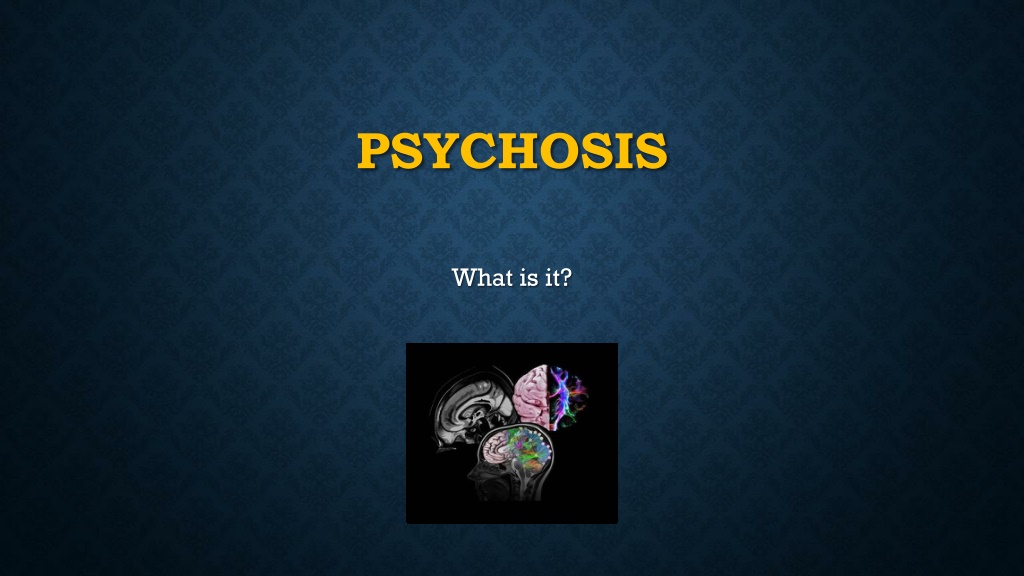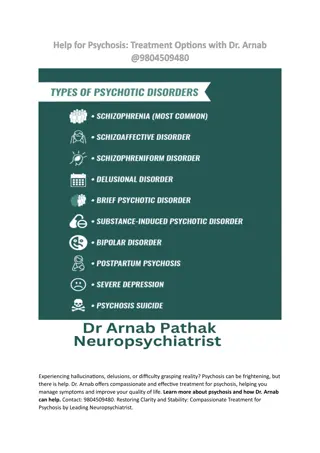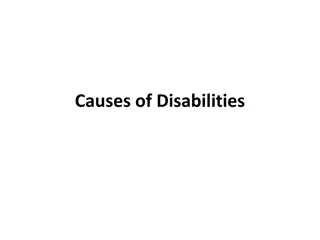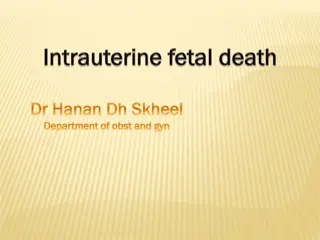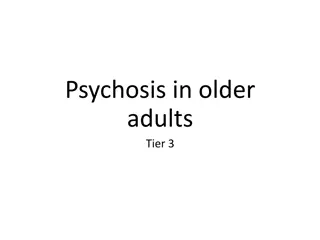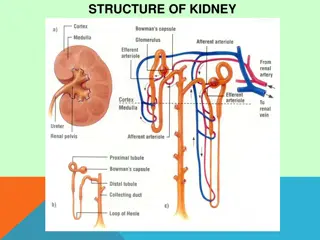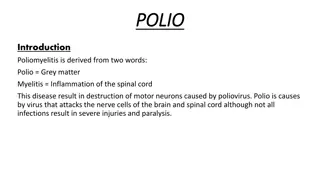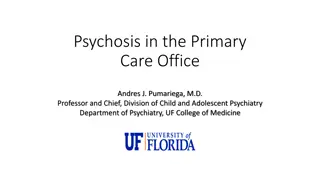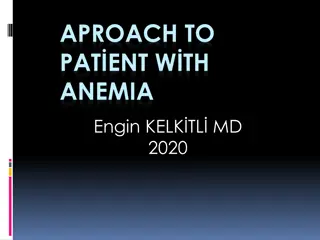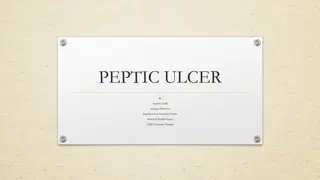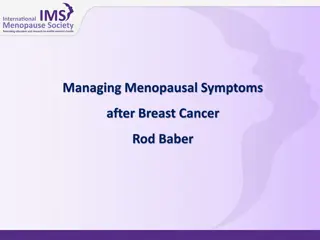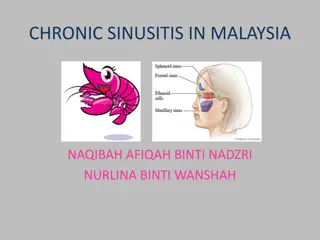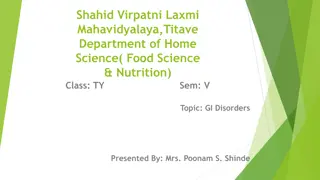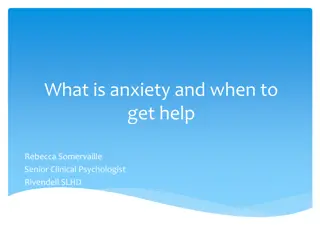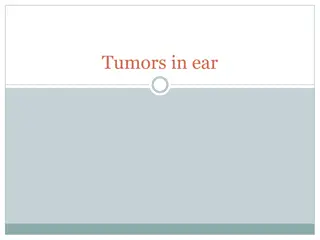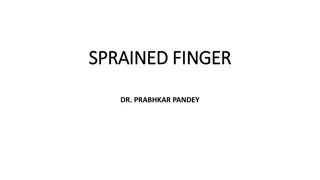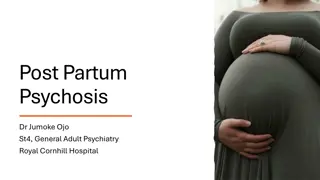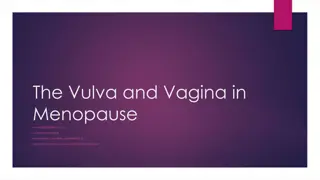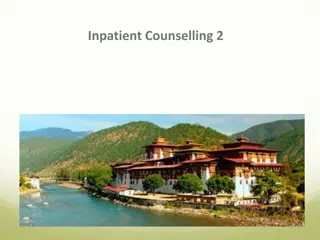Understanding Psychosis: Symptoms, Causes, and Impact
Psychosis is a condition where an individual experiences hallucinations, delusions, and changes in behavior and communication. It can be caused by various factors such as trauma, drug use, and poor mental health. Distinguishing between psychotic experiences and a psychotic disorder is crucial in providing appropriate support and treatment.
Download Presentation

Please find below an Image/Link to download the presentation.
The content on the website is provided AS IS for your information and personal use only. It may not be sold, licensed, or shared on other websites without obtaining consent from the author. Download presentation by click this link. If you encounter any issues during the download, it is possible that the publisher has removed the file from their server.
E N D
Presentation Transcript
PSYCHOSIS What is it?
WHAT IS PSYCHOSIS? A term used to describe a set of experiences a person is having that affects their: Perceptions the person sees, hears and experiences things that are not there. Thinking disorganised thinking and experiences of unusual false beliefs (delusions). Behaviours change in motivation stopping to engage in social life or regular activities. Communication people with psychosis can find it challenging to communicate. Hallucinations and delusions are referred to as psychotic experiences.
PSYCHOTIC EXPERIENCES VERSUS PSYCHOTIC DISORDER Having psychotic experiences are a regular occurrence. Commonly associated with childhood, the delusions or hallucinations are short-lived, don t last and are not a symptom of psychotic disorder. Psychotic disorder is a medical diagnosis. People with psychotic disorder will experience hallucinations and delusions often. They may be distressing for the person. It will negatively affect their life. It will negatively affect the relationships in their lives.
WHAT CAUSES PSYCHOSIS? Psychosis is very complex and there are a variety of reasons why someone may experience it. Delayed childhood development and general vulnerability. Being a victim of trauma, abuse and/or violence. Stress at a young age. This can be life events, such as bereavement or environmental, such as growing up in poverty. Poor mental health increases the likelihood of someone experiencing psychosis. Certain drugs are associated with a higher risk of psychosis. Cannabis has been found to be one of the highest risk factors for psychosis, particularly as THC levels increase and synthetic cannabinoids. Using drugs in adolescence is a risk factor for psychosis.
WHAT DOES IT LOOK LIKE? Auditory hallucinations affect hearing. A person with psychosis will hear voices and sounds that are not there. Visual hallucinations affect perception. A person will see things, objects and people that are not there. Gustatory hallucinations affect taste. A person with psychosis will taste things they haven t eaten. A person with psychosis will sense someone touching them when nothing is near them which is referred to as haptic hallucinations. Olfactory hallucinations affect smell and a person experiencing psychosis will smell odours that are not present.
PSYCHOSIS We all think we hear, see, taste, feel and smell things occasionally. Psychosis is experiencing these things intensely, to a degree that it is obvious. The person is very distracted, appears not to hear you speak, or be fully aware of your presence. They may laugh randomly as though listening to someone else. The delusions they feel are held with conviction and it is very difficult to persuade the person what they are seeing/experiencing is not true, even in the absence or presence of evidence. A person experiencing psychosis will demonstrate severe paranoia. They will believe everyone is out to get them or harm them.
PSYCHOSIS They believe they have extra special powers that no one else has. They may believe they are being spied on in their home. They may believe another force is trying to control them, telling them what to do. They may believe that topics on the news carry special information for them. They may believe that particular gestures made by strangers are signs they are under threat. Their emotions may change and the way they feel may change. They lose pleasure for things they used to enjoy (anhedonia). They may seem emotionally flat (blunted affect). They can feel hopeless and are at higher risk of suicide.
PSYCHOSIS They will withdraw from contact with people. They may have jumbled speech and/or slowed speech. They will become super focused on their own experiences. They may become fixated with a topic/person/idea. They will lose interest in personal hygiene. They will lose interest in maintaining their home. They may stop taking, or not want to take, medication they have been prescribed.
FIVE TYPES OF PSYCHOTIC DISORDERS Delusional Disorder describes a disorder where the main symptom is delusions. Schizophrenia refers to a disorder that represents a combination of all symptoms: Hallucinations. Delusions. Behavioural changes. Thinking difficulties.
SCHIZOAFFECTIVE DISORDER This disorder is a combination of psychotic symptoms and mood problems. The main two mood problems are depression and mania. Depression means the person can experience very low mood and/or be very angry. They may feel very numb as though they have no feelings at all. Loss of motivation and interest in anything. Significant sleeping and eating problems. (lack of both)
SCHIZOAFFECTIVE DISORDER CONTINUED Mania causes a person to experience a feeling of extreme well-being. The person may have excessive energy. They may feel very high in mood/elated. They may speak very fast. They may act impulsively, for example, spending lots of money they don t have or on things they don t need.
BRIEF PSYCHOTIC EPISODE A single episode of psychosis experienced, often brought on by stress. The person will experience the same psychotic break, having hallucinations, delusions, change in behaviour and disorganised thinking/communication but it will be short and will pass.
DRUG INDUCED PSYCHOSIS Someone taking high levels of drugs can develop a drug induced psychosis. The toxic levels in drugs can initiate hallucinations and delusions. Cannabis is recognised as posing a risk of psychosis. Cocaine, crack cocaine, alcohol, methamphetamine, ecstasy, GHB and GHL can also cause a drug induced psychosis. For many people, the psychosis will pass, however for some, it will be the beginning of a long-term psychotic disorder.
TREATMENT Psychosis typically requires treatment as it usually progresses over time and will not pass. A full assessment is completed. Anti-psychotic medication is typically prescribed for someone suffering with psychosis in the first instance. Treatment depends on the cause. Social, psychological, occupational and educational interventions are developed by a Community Mental Health Team (CMHT)
ANTI-PSYCHOTIC MEDICATION The medication will not suit or be affective for some people. It will be required to be taken on a long-term basis. Medication can be taken in tablet form daily or slow, long doses injected monthly. The medication can cause side-effects such as drowsiness, shaking, weight gain, restlessness, muscle spasms, dizziness, blurred vision, constipation, loss of libido and dry mouth. Medication requires being weaned off to prevent relapse. Cognitive behavioural therapy can be part of the treatment.
INVOLUNTARY ADMISSION TO TREATMENT In certain circumstances, should a psychosis be severe enough, a person can be admitted involuntarily for treatment as they may pose a risk to themselves and others. If admitted involuntarily, you will be entitled to a solicitor free of charge. You will have legal rights that must be upheld. The solicitor will facilitate you in preparation for a Tribunal to determine length of stay. You will be assessed also by an independent consultant psychiatrist. The team will help support you following your return home and set up a support plan with you.
DRUG PSYCHOSIS AND INVOLUNTARY ADMISSION Under the Mental Health Act 2001, you may be involuntarily admitted and detained in an approved psychiatric centre if you are suffering from a mental disorder. You may not be admitted purely because you are suffering from a personality disorder, are socially deviant or addicted to drugs or intoxicants. This issue is being raised by services and recommendations for dual diagnosis have been submitted to the Citizens Assembly on Drugs in Ireland 2023. Having severe psychosis presents a significant danger to the person and others and regardless of why they have the psychosis, it would be morally and socially beneficial to allow those suffering with drug induced psychosis to be treated.
PSYCHOSIS If you think someone you know is suffering from a psychosis, seek immediate help. 999/112 if a severe psychosis appears present and you cannot get the person to get help call the authorities. The guards may have to arrest the person under the Mental Health Act. Request a guard/service person who has experience with mental health. Any concerned person can submit an involuntary admission order for someone they are concerned about including a stranger.
SOURCES/REFERENCES Health Service Executive. (2022) Health A to Z: Psychosis symptoms. https://www2.hse.ie/conditions/psychosis/ Drugs.ie [Last Accessed]05/01/2024 Images free to use and share commercially: Google.ie For more information follow the link below; Psychosis symptoms - HSE.ie
